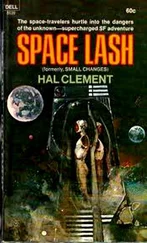The man certainly could not be accused of stupidity; it was not his fault that he failed to experience a flash of insight that would give the clue to the alien’s meaning. The great majority of people would have done no better, except, perhaps, for some lucky chance. Human experience of thought transference is limited to the claims of “psychics” and to fantastic literature, except for a few scientific experiments of doubtful value; Kirk was not addicted to the reading of any of these products of mental aberration, and made no claim to be any sort of scientist. He had begun by jumping to a conclusion, and for some time it simply did not occur to him that the conclusion might be erroneous — the evidence had been quite convincing, to him, that Talker was acquainted with the English language. It followed that the mothlike one’s intentions, motivating all this gesticulation and writing, were to teach Kirk the same tongue: an idea so exactly opposite the true state of affairs as to be almost comical.
Twice more Talker repeated his forlorn attempt to get his idea across to the other; twice Kirk repeated his expostulation, once going so far as to write it out on the ground, when it occurred to him that Talker might be deaf. The third time, the Earthling’s temper broke free of its moorings — almost. He was not accustomed to using profanity; his family, whose elder members had carefully controlled his upbringing, was almost Puritanical in that respect, and habit got control of his reactions in time to prevent his speaking aloud the words in his mind. His reaction may be imagined when, without Kirk’s having uttered a sound, except for a strangled snort, Talker extended a forelimb and scratched a perfectly legible “Damn” on the bare patch of ground.
The word “insight” provides a psychologist with material for hours of talk. Its precise meaning cannot be given without tacit assumption of understanding of its nature; neither Kirk nor the narrator possesses that understanding. It is assumed that the readers have had experience of insight, and can understand the habit of cartoonists of symbolizing its presence by an incandescent bulb — whether this habit antedates or succeeds the coining of the phrase “to see light” is a purely academic question. All that matters to us is the fact that Kirk abruptly saw the light — dimly at first, and then, though it strained his credulity to the breaking point, with something like comprehension. Why that particular incident should have served to unlock the door we cannot say: certainly Talker’s knowledge of a bit of English profanity could have had many other explanations. Insight, as we have intimated, is a rather obscure process.
For almost a full minute, Earthling and alien stared at each other, the former struggling with his own prejudices and the latter wondering what had happened — even he, unused to interpreting human attitudes, could perceive that Kirk was disturbed, Then the Earthman, with the seeds of truth rapidly maturing in his mind, deliberately visualized a simple design — a circle inscribed in a square. Talker promptly and accurately reproduced it on his improvised blackboard. Kirk tried various letters of the English and Greek alphabets, and finally satisfied himself that Talker was actually obtaining the impressions directly from the thoughts. Talker, for his part, discovered that the visual impressions were almost as clear to him now as those of Boss, who had lost his patience and temper long before the Earthman, and had withdrawn by request. He was now sulking, once more squatting in the air lock.
The auditory impressions and abstract thoughts were still a hopeless confusion, so far as Talker was concerned; he never did make a serious attempt to unravel them. Both he and Kirk were satisfied to have found a common ground for expression, and completely ignored lesser matters.
Kirk seated himself on the ground beside Talker, and an intensive course in English was rapidly embarked upon.
Not until the Sun was low did Kirk abandon the task, and then it was only because of hunger.
Talker had already learned enough to understand the man’s declaration that he would return in the morning; and Kirk went back to his camp in the gathering dusk, to prepare a meal and obtain a few hours’ sleep — very few, as may well be imagined. He spent a good deal of the night awake in his blankets, staring up at the clear sky and wondering, at times aloud, from which of the thousands of points of light his new acquaintance had come. He was sufficiently adventurous by nature not to ask himself why they had come.
Talker watched the man disappear into the woods, and turned wearily toward the ship. He was overtired; the effects of the earlier dose of accelerine were beginning to abate, and he had a well-founded objection to taking more of the stuff than was necessary to keep him alive. With an effort, he flew the few yards between the bank and the air lock, settling heavily beside Boss. The sound of his wings woke the commander, who eagerly demanded a report on progress in communication. Talker obliged, somewhat shortly; his fatigue had brought him unusually close to anger.
“I have made a beginning, in spite of your aid. How long it will take to set up working communication, I don’t know; but I will try to direct the conversations so that the ideas we need to impart are used. He will be back when the Sun rises again; in the meantime, I need sleep. Don’t disturb me until the native returns.”
Boss was too elated at Talker’s news to take offense at his manner. He allowed the herald to depart to his own quarters, and went off himself to spread the news, after closing the outer airlock door. The second in command received the information with glee, and in short order the crew was in better spirits than it had enjoyed since landing on this unhealthy and uncomfortable planet.
Even the inhabitants of the sick bay, now three in number since the decoy who had gone after Kirk had returned with a complete set of pulled wing ligaments, began to feel that they were suffering in a good cause, and ceased thinking uncomplimentary thoughts about their officers.
The doctor, too, usually by far the most pessimistic member of the ship’s personnel, ceased making pointed remarks about “wasted effort” as he worked over his patients. Not one of them appreciated the very real difficulties that still lay ahead, before Talker would have any chance of making the human being understand their needs. None thought that anything more than the transmission of that knowledge would be necessary; and all, except Talker, regarded that matter as practically solved.
The herald had a better appreciation of what lay before him, and was far from sure of his course of action. He had promised Boss to arrange matters so that their needs would be among the first things to be transmitted to the Earthling; but he could not see how he was to fulfill the promise.
Had it been merely a matter of keeping his word to the commander, Talker would not have been bothered in the least; he considered anything said to Boss was justified if it succeeded in bothering him. Unfortunately, Talker’s own future existence depended on his ability to carry out the terms of that promise. Even with his lack of experience in learning, or teaching, languages, it occurred to him that making advanced chemistry the subject of the lessons was bound to be rather awkward. One cannot point out atoms and molecules individually; it would be pure chance if the man recognized either diagrams or samples, since the latter would be of value only to a chemist with a laboratory, and the former might not — probably would not — conform to human theories of atomic formation. It did not occur to Talker that the ship’s pharmacist might be of help; he had been out of contact with his own class for so long that an unfortunate, but almost inevitable, sense of his own superiority had grown up within him. The rest of the crew, to him, were mere laborers; he had never talked with any of them as friend to friend; he had solved all his own problems since joining the crew, and would undoubtedly continue to do so unless and until something drastic forced him out of his rut. But it said for him that he was not conceited in the ordinary sense of the word; the feeling of superiority was the result of class training; and the ignoring of others’ abilities was completely unconscious.
Читать дальше












